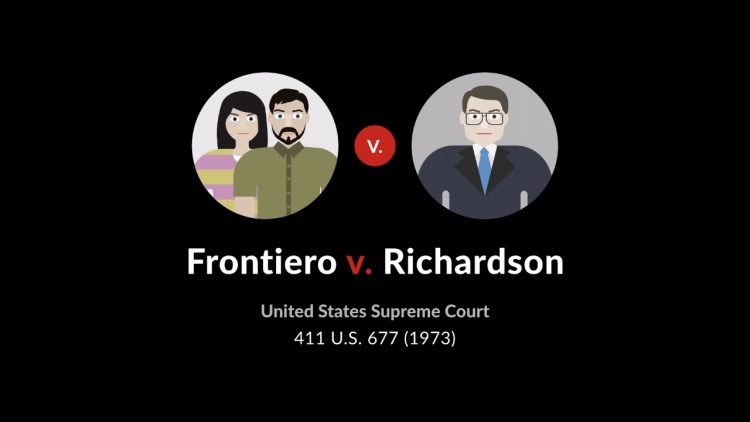Frontiero v. Richardson
United States Supreme Court
411 U.S. 677 (1973)
- Written by Megan Petersen, JD
Facts
Congress passed a law granting members of the armed services with dependents an increased housing allowance, as well as medical and dental benefits for their dependents. Under the law, a serviceman was permitted to claim his wife as a dependent, regardless of whether the wife was actually dependent on the serviceman for support. In contrast, a servicewoman was permitted to claim her husband as a dependent only upon showing that her husband was actually dependent on her for more than half of his support. Sharron Frontiero (plaintiff), a member of the United States Air Force, tried to claim her husband, Joseph Frontiero (plaintiff), as a dependent. Frontiero’s application was denied because she did not make the required showing of dependence. The Frontieros brought suit in federal district court against Secretary of Defense Elliot Richardson and others (defendants). The Frontieros alleged that the law violated the procedural and substantive requirements of the Fifth Amendment’s Due Process Clause by imposing additional procedural burdens on female servicemembers and denying them access to benefits available to male servicemembers. A majority of a three-judge district-court panel upheld the law, concluding that Congress might have believed the policy was economical and efficient because husbands often had financially dependent wives while wives rarely had financially dependent husbands. The Frontieros appealed directly to the United States Supreme Court.
Rule of Law
Issue
Holding and Reasoning (Brennan, J.)
Concurrence (Stewart, J.)
Concurrence (Powell, J.)
Dissent (Rehnquist, J.)
What to do next…
Here's why 907,000 law students have relied on our case briefs:
- Written by law professors and practitioners, not other law students. 47,100 briefs, keyed to 996 casebooks. Top-notch customer support.
- The right amount of information, includes the facts, issues, rule of law, holding and reasoning, and any concurrences and dissents.
- Access in your classes, works on your mobile and tablet. Massive library of related video lessons and high quality multiple-choice questions.
- Easy to use, uniform format for every case brief. Written in plain English, not in legalese. Our briefs summarize and simplify; they don’t just repeat the court’s language.





